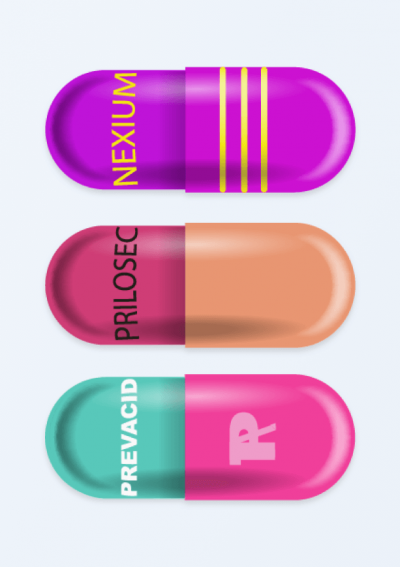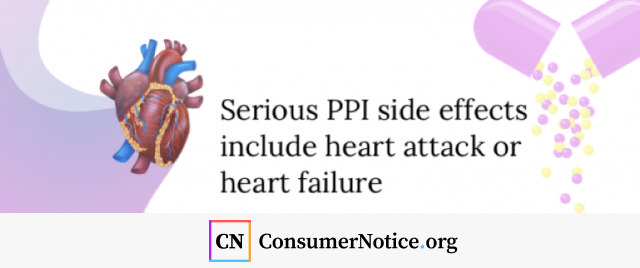Proton Pump Inhibitors
Proton pump inhibitors, or PPIs, are powerful stomach-acid-reducing drugs available by prescription or over-the-counter. Critics say the drugs are overprescribed to treat heartburn and frequently misused and that patients and doctors are often unaware of the drugs’ potentially deadly side effects.

Proton pump inhibitors, which include familiar brand name medicines such as Nexium, Prilosec and Prevacid, are among the most prescribed drugs in the United States.
More than 15 million Americans have prescriptions for PPIs, and many millions more buy over-the-counter versions of the drugs, according to research from Washington University in St. Louis.
PPIs account for $10 billion in health care spending in the United States, and global spending on the drugs tops $25 billion per year, according to articles in Pharmacy Today and Therapeutic Advances in Drug Safety.
In May 2018, Dr. Daniel Freedberg, a gastroenterologist for New York-Presbyterian Hospital, wrote in the opinion magazine of the American Gastroenterological Association that up to 15% of Americans had used a PPI sometime in the last year and as many as one in 10 consumers had taken a PPI within the last month.
PPIs are very effective at treating conditions caused by excess stomach acid. But they are not intended for occasional heartburn.
The U.S. Food and Drug Administration warns people to never take over-the-counter versions for more than 14 days. And the agency cautions against taking a 14-day course more than three times per year.
Studies have found long-term PPI use may result in serious side effects, including bone fractures, gut infections and sometimes life-threatening kidney problems. Always consult with a doctor before you make changes to your medications. Stopping PPIs without a step-down plan can result in serious health problems.
What Are PPIs and How Do They Work?
PPIs are the most powerful type of medicine available for reducing stomach acid, according to Harvard Health Publishing. The medicine comes in capsules, tablets and/or a powder, depending on the brand. Instructions usually say to take the medicine a half-hour or an hour before the first meal of the day.
Your stomach relies on acid to help you digest the food you eat. Proton pumps in the lining of your stomach produce the acid. But excess acid can damage the esophagus or create a burning sensation in the chest called heartburn.
Once a PPI enters the bloodstream and reaches the stomach lining, it blocks the tiny pumps from churning out gastric acid.
Brands and Types
The FDA approved Prilosec as a prescription treatment for gastroesophageal reflux disease, or GERD, in 1989. It was the first PPI approved in the United States.
Since then, several other brand name PPIs have hit the market. The FDA has also approved over-the-counter versions and a lengthy list of generic versions of the drugs.
Prescription & OTC PPIs
| Brand Name | Generic Name | Over-The-Counter Versions Available |
|---|---|---|
| Nexium | Esomeprazole | Nexium 24HR |
| Prevacid | Lansoprazole | Prevacid 24HR |
| Prilosec | Omeprazole | Prilosec OTC |
| Zegerid | Omeprazole with sodium bicarbonate | Zegerid OTC |
| AcipHex | Rabeprazole | None |
| Dexilant | Dexlansoprazole | None |
| Protonix | Pantoprazole | None |
| Vimovo | Esomeprazole and Naproxen | None |
What Do PPIs Treat?
Prescription and over-the-counter versions of PPIs are approved to treat different conditions. But doctors may tell people who need prescription treatment to use over-the-counter versions to save money.
Prescription PPIs are approved to treat GERD and GERD-related laryngitis; duodenal ulcers and Helicobacter pylori infection associated with them; gastric ulcers; erosive esophagitis; and hypersecretory conditions, such as Zollinger-Ellison syndrome.
Over-the-counter PPIs are only approved to treat frequent heartburn.
Off-Label Uses
Off-label uses are uses that the FDA has not approved. One of the most common off-label uses of PPIs is when patients take the over-the-counter versions of the drugs for longer than the agency recommends.
The FDA has approved over-the-counter PPIs only for a 14-day course of treatment up to three times per year. But the agency acknowledges that consumers on their own or based on a doctor’s recommendation may break those rules. The FDA considers this an unapproved use of PPIs.
“Be aware that consumers either on their own, or based on a health care professional’s recommendation, may take OTC PPIs for periods of time that exceed the directions on the OTC label. This is considered an off-label (unapproved) use,” the FDA said in a March 2011 safety announcement.
Be aware that consumers either on their own, or based on a health care professional's recommendation, may take OTC PPIs for periods of time that exceed the directions on the OTC label. This is considered an off-label (unapproved) use.
Taking OTC PPIs for longer than the FDA-approved regimen can have serious consequences. Studies have found long-term use can result in kidney damage or life-threatening conditions and premature death.
Side Effects
Side effects with PPIs are relatively rare, and the most common side effects tend to be minor. Some of the most common PPI side effects include:
- Abdominal pain
- Anxiety
- Constipation
- Diarrhea
- Dizziness
- Drowsiness
- Dry mouth
- Gas
- Headaches
- Inability to properly absorb nutrients
- Joint pain
- Rash or other skin issues
But these drugs can also cause serious side effects in very rare cases. Some of these can result in serious injury, long-term health problems and life-threatening conditions. People have filed proton pump inhibitor lawsuits to seek compensation for pain and suffering and to cover medical expenses. Plaintiffs allege that the heartburn drugs they took damaged their kidneys and that drugmakers knew about the potential risks of kidney damage long before the FDA acted, but the companies failed to warn the public.
The most serious PPI side effects and risks revealed in studies include:
- Bacterial infections
- Bone fractures
- Heart attack or heart failure
- Kidney disease or injuries
- Premature death
- Damage to arteries
- Depression
- Stroke
Most serious side effects are associated with long-term use of PPIs. The FDA has stated on multiple occasions that the risk of serious health problems increases with longer durations of PPI use. The agency also advises careful use of PPIs.

Overuse and Misuse
A study published in Therapeutic Advances in Drug Safety in November 2018 estimated that between 25% and 70% of PPI prescriptions are for a condition the drugs do not treat.
PPIs are more expensive than antacids, such as Rolaids or Tums, and H2 blockers, such as Pepcid, Zantac or Tagamet. And those PPI alternatives may be better suited for you if you experience only occasional heartburn.
In most cases, PPIs should only be taken for a short time. The FDA-recommended time period for prescription PPI use is 4 to 8 weeks. To avoid rebound acid reflux the PPI should be gradually discontinued and supplemented with a histamine-2 receptor blocker (H2RA), for example ranitidine 400 mg per day, over the course of a month.
One of the most notable forms of overprescribing PPIs happens when a person is hospitalized. The drugs are often given to hospitalized patients to prevent heartburn during their stay. But in many cases, doctors will continue to prescribe the drugs for months or years even though the patients don’t need them.
Doctors may prescribe or recommend OTC proton pump inhibitors if a patient has a few bouts with reflux. But the patient may wind up taking the drugs for months or years.
It is a good idea to at least once a year have your doctor or pharmacist review all the drugs you are taking. They can determine whether you should still be on drugs such as PPIs.
In his 2018 article in AGA Perspectives, Freedberg argued that PPI benefits outweigh the risks if they are used appropriately, but he also pointed out that PPI prescriptions are often given to patients for an inappropriate condition or continued for too long after they’re first prescribed.
He said serious side effects from long-term use are extremely rare. But in a warning to his fellow gastroenterologists, he wrote that if one of their patients suffers an adverse event from unnecessarily taking PPIs, “you will regret it.”
“The problem with PPIs is not that they are dangerous but that they are overprescribed,” Freedberg said.
Stopping PPIs Safely
You should never stop taking a PPI without first talking to a doctor, pharmacist or other health care professional who has a clear understanding of the drug’s effects. Stopping PPI use suddenly can cause the underlying condition to come back worse than before. It may also lead to other health problems.
In some cases, it may be safer to continue taking the PPI than to stop taking it. If a doctor believes you could benefit from switching to a different treatment, they will likely work out a way to get you off the drug gradually.
23 Cited Research Articles
Consumernotice.org adheres to the highest ethical standards for content production and references only credible sources of information, including government reports, interviews with experts, highly regarded nonprofit organizations, peer-reviewed journals, court records and academic organizations. You can learn more about our dedication to relevance, accuracy and transparency by reading our editorial policy.
- Jaynes, M. & Kumar, A.B. (2018, November 19). The Risks of Long-Term Use of Proton Pump Inhibitors: A Critical Review. Therapeutic Advances in Drug Safety. Retrieved from https://journals.sagepub.com/doi/full/10.1177/2042098618809927
- Hussain, S. et al. (2018, November). Proton Pump Inhibitors’ Use and Risk of Hip Fracture: A Systematic Review and Meta-Analysis. Rheumatology International. Retrieved from https://www.ncbi.nlm.nih.gov/pubmed/30159775
- Mangin, D. et al. (2018, November). Legacy Drug-Prescribing Patterns in Primary Care. Annals of Family Medicine. Retrieved from https://www.annfammed.org/content/16/6/515.full
- Rodriguez-Poncelas, A. et al. (2018, October 17). Duration and Dosing of Proton Pump Inhibitors Associated with High Incidence of Chronic Kidney Disease in Population-Based Cohort. PLoS One. Retrieved from https://journals.plos.org/plosone/article?id=10.1371/journal.pone.0204231
- Lee, H.J. et al. (2018, September 13). Chronic Kidney Disease (CKD) Patients Are Exposed to More Proton Pump Inhibitor (PPI)s Compared to Non-CKD Patients. PLoS One. Retrieved from https://www.ncbi.nlm.nih.gov/pmc/articles/PMC6136773/
- Nassar, Y. & Richter, S. (2018, August). Proton-Pump Inhibitor Use and Fracture Risk: An Updated Systematic Review and Meta-Analysis. Journal of Bone Metabolism. Retrieved from https://www.ncbi.nlm.nih.gov/pubmed/30237993
- Hálfdánarson, Ó.Ö. et al. (2018, May 30). Proton-Pump Inhibitors Among Adults: A Nationwide Drug-Utilization Study. Therapeutic Advances in Gastroenterology. Retrieved from https://www.ncbi.nlm.nih.gov/pmc/articles/PMC5977421/
- U.S. Food and Drug Administration. (2018, March 5). Over-The-Counter (OTC) Heartburn Treatment. Drugs. Retrieved from https://www.fda.gov/drugs/drug-information-consumers/over-counter-otc-heartburn-treatment
- Kinoshita, Y., Ishimura, N. & Ishihara, S. (2018, April 1). Advantages and Disadvantages of Long-Term Proton Pump Inhibitor Use. Journal of Neurogastroenterology and Motility. Retrieved from https://www.ncbi.nlm.nih.gov/pmc/articles/PMC5885718/
- Brussalaers, N., Engstrand, L. & Lagergren, J. (2018, April). Maintenance Proton Pump Inhibition Therapy and Risk of Oesophageal Cancer. Cancer Epidemiology. Retrieved from https://www.sciencedirect.com/science/article/pii/S1877782118300687?via%3Dihub
- Jenkins, K. (2018, March 5). Long-Term PPI Use and Increased Esophageal CA Risk. Medscape. Retrieved from https://www.medscape.com/viewarticle/893399#vp_1
- Nehra, A.K. et al. (2018, February). Proton Pump Inhibitors: Review of Emerging Concerns. Mayo Clinic Proceedings. Retrieved from https://www.mayoclinicproceedings.org/article/S0025-6196%2817%2930841-8/pdf
- Dougherty, M. & Dellon, E.S. (2018, February). And Now, Death by Proton Pump Inhibitor. Gastroenterology. Retrieved from https://www.gastrojournal.org/article/S0016-5085%2818%2930027-1/fulltext
- Carr, T. (2017, August 3). Too Many Meds? America’s Love Affair With Prescription Medication. Consumer Reports. Retrieved from https://www.consumerreports.org/prescription-drugs/too-many-meds-americas-love-affair-with-prescription-medication/
- National Institutes of Health. (2017, April 24). Proton Pump Inhibitors. MedlinePlus, U.S. National Library of Medicine. Retrieved from https://medlineplus.gov/ency/patientinstructions/000381.htm
- Washington University in St. Louis. (2017, February 22). Popular Heartburn Drugs Linked to Gradual Yet 'Silent' Kidney Damage: Most Patients Don't Experience Acute Kidney Problems Beforehand. ScienceDaily. Retrieved from https://www.sciencedaily.com/releases/2017/02/170222082252.htm
- Xie, Y. et al. (2017, February 22). Long-Term Kidney Outcomes Among Users of Proton Pump Inhibitors Without Intervening Acute Kidney Injury. Kidney International. Retrieved from https://linkinghub.elsevier.com/retrieve/pii/S0085253817300054
- Strand, D.S., Kim, D. & Peura, D.A. (2016, November 4). 25 Years of Proton Pump Inhibitors: A Comprehensive Review. Gut and Liver. Retrieved from https://www.ncbi.nlm.nih.gov/pmc/articles/PMC5221858/
- Hertz, B.T. (2016, March). Reducing Unnecessary PPI Use May Help Save Lives. ACP Hospitalist. Retrieved from https://www.acphospitalist.org/archives/2016/03/unnecessary-PPIs.htm
- Lazarus, B. et al. (2016, February). Proton Pump Inhibitor Use and the Risk of Chronic Kidney Disease. JAMA Internal Medicine. Retrieved from https://www.ncbi.nlm.nih.gov/pubmed/26752337
- Kwok, C.S. et al. (2012, July). Risk of Clostridium Difficile Infection with Acid Suppressing Drugs and Antibiotics: Meta-Analysis. American Journal of Gastroenterology. Retrieved from https://www.ncbi.nlm.nih.gov/pubmed/22525304
- Harvard Health Publishing. (2011, April). Proton-pump inhibitors. Retrieved from https://www.health.harvard.edu/diseases-and-conditions/proton-pump-inhibitors
- U.S. Food and Drug Administration. (2011, March 2). FDA Drug Safety Communication: Low Magnesium Levels Can Be Associated With Long-Term Use of Proton Pump Inhibitor Drugs (PPIs). Retrieved from https://www.fda.gov/drugs/drug-safety-and-availability/fda-drug-safety-communication-low-magnesium-levels-can-be-associated-long-term-use-proton-pump
Calling this number connects you with a Consumer Notice, LLC representative. We will direct you to one of our trusted legal partners for a free case review.
Consumer Notice, LLC's trusted legal partners support the organization's mission to keep people safe from dangerous drugs and medical devices. For more information, visit our partners page.
844-420-1914

